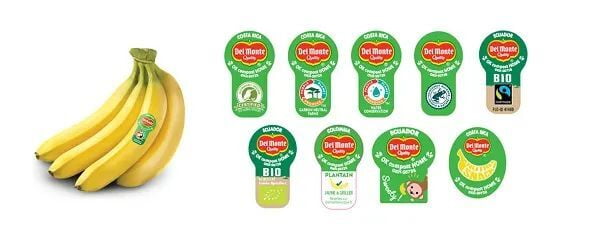Del Monte France is switching to plastic-free, compostable stickers for all the bananas it sells in France. In this way, the French branch of the Fresh Del Monte Group is demonstrating its intention to strengthen its commitment to sustainable development.
These stickers comply with the French standard for home composting (NF T 51-800) and also with the circular economy anti-waste law (AGEC, n° 2020-105, article 80). These new stickers are "OK compost HOME" certified to ensure that their ingredients - adhesives, materials and inks - do not have any negative impact on the environment. . They also meet all the food safety requirements of the European Union. "Del Monte is one of the first major brands in France to offer this sustainable alternative for France's most popular fruits," explains Eric Hellot, President and Director of Del Monte France SAS.

These new stickers can be found on different varieties of bananas (Cavendish, Mini, Plantain), different origins (Costa Rica, Ecuador ......) and different certifications (Sustainably Grown SCS Global Services, Organic, Fair Trade, Rainforest Alliance).
While composting is nature's way of recycling natural waste, stickers should not be discarded in nature, but in an environment designed for that purpose. In a compost bin, the right amount of dry material (or brown waste such as twigs or paper) and wet material (or green waste such as cut grass or fruit kernels) ensures that it is converted into something useful. If you don't have a compost bin, a trash can or sorting container will do.
Fresh Del Monte, a sustainable and resilient company.
These new stickers are a logical extension of Fresh Del Monte's global policy. The company wants to minimize the use of plastic, promote recycling and find ways to reduce plastic waste so it doesn't end up in landfills, oceans or seas. For several years, Del Monte has been investing in new materials and rethinking existing ones.
The company wants to reduce primary plastic use in consumer packaging by 25 percent by 2025, use only 100 percent recyclable plastic packaging by 2030, double the amount of recyclable material in its secondary packaging by 2026, double the number of recyclable crates to 2027 plastic (RPC), and ensure that at least 65 percent of shipping crates purchased globally are certified as responsibly sourced (FSC, PEFC or SFI) by 2023.

